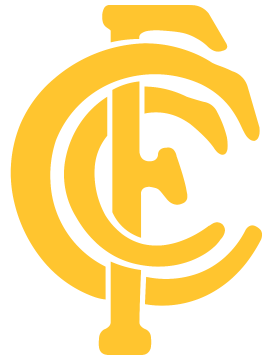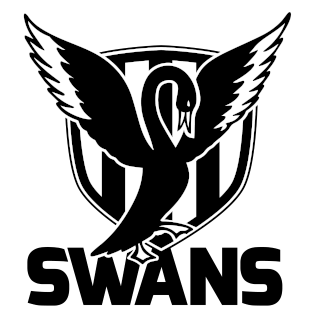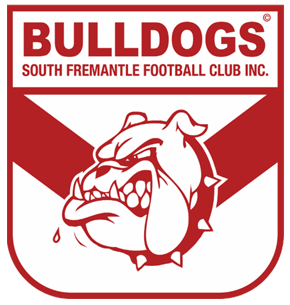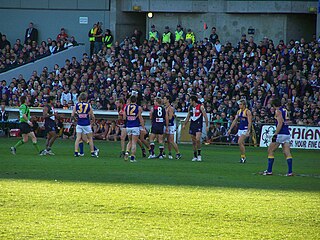Related Research Articles

The West Australian Football League is an Australian rules football league based in Perth, Western Australia. The league currently consists of ten teams, which play each other in a 20-round season usually lasting from April to September, with the top five teams playing off in a finals series, culminating in a Grand Final. The league also runs reserves, colts (under-19) and women's competitions.
Haydn Austin Bunton is a former Australian rules footballer and coach. The son of the legendary Haydn Bunton Sr., Bunton Jr. played for North Adelaide and Norwood in the South Australian National Football League (SANFL), as well as Swan Districts and Subiaco in the Western Australian National Football League (WANFL).

The Claremont Football Club, nicknamed Tigers, is an Australian rules football club based in Claremont, Western Australia, that currently plays in the West Australian Football League (WAFL) and WAFL Women's (WAFLW). Its official colours are navy blue and gold. Formed as the "Cottesloe Beach Football Club" in 1906, the club entering the WAFL in 1925 as the "Claremont-Cottesloe Football Club"', changing its name to the present in 1935. Claremont have won 12 senior men's premierships since entering the competition, including most recently the 2011 and 2012 premierships.

The Swan Districts Football Club, nicknamed the Swans, is an Australian rules football club playing in the West Australian Football League (WAFL) and WAFL Women's (WAFLW). The club is based at Bassendean Oval, in Bassendean, an eastern suburb of Perth, Western Australia. The club was formed in 1933, and joined the then-Western Australian National Football League (WANFL) in 1934, acting as a successor to the Midland Junction Football Club, which had disbanded during World War I, in the Perth Hills region.

The Subiaco Football Club, nicknamed the Lions and known before 1973 as the Maroons, is an Australian rules football club in the West Australian Football League (WAFL) and WAFL Women's (WAFLW). It was founded in 1896, and admitted to the WAFL in 1901, along with North Fremantle. The club is currently based at Leederville Oval, having previously played at Subiaco Oval.

South Fremantle Football Club is an Australian rules football club based in Fremantle, Western Australia. The club plays in the Western Australian Football League (WAFL) and the WAFL Women's (WAFLW), commonly going by the nickname the Bulldogs. Since its founding, the club has won 14 WAFL premierships, the most recent of them in 2020.
Stephen "Steve" Malaxos is a former Australian rules footballer and coach from Western Australia. While playing for Claremont in the WAFL, he won the 1984 Sandover Medal. Malaxos was an All-Australian with Claremont in 1986 and while he was with the West Coast Eagles in 1988. He was the inaugural fairest and best player at West Coast (1987), holds the Eagles' record for the most possessions in a game (48) and captained the club in 1990.
Gerard Joseph Neesham is a former Australian rules footballer who played for the Sydney Swans in the Victorian Football League (VFL) and for the East Fremantle Football Club, Swan Districts Football Club and Claremont Football Club in the West Australian Football League (WAFL).
Brian Francis Peake OAM is a former Australian rules footballer who played for East Fremantle and Perth in the West Australian Football League (WAFL), and Geelong in the Victorian Football League (VFL). He also played State of Origin football for Western Australia from 1978 to 1987, captaining the side in 1979, 1980, 1986 and 1987. Peake was awarded the Medal of the Order of Australia in 1990 and was inducted into the West Australian Football Hall of Fame in 2004, and into the Australian Football Hall of Fame in 2013.

Australian rules football in Western Australia (WA) is the most popular sport in the state. It is governed by the West Australian Football Commission (WAFC).
Luke Blackwell is an Australian rules footballer. He formerly played for Carlton in the Australian Football League (AFL), and for Claremont in the West Australian Football League (WAFL) where he was the winner of the 2011 Sandover Medal.
Malcolm Gregory "Mal" Brown is a former Australian rules footballer in the Victorian Football League and West Australian National Football League. He is described as "one of the most colourful and controversial characters" of the game.
Scott Watters is a former Australian rules football player and coach. As a player, he was drafted from the South Fremantle Football Club in the West Australian Football League (WAFL) to the West Coast Eagles in the Australian Football League (AFL) in 1988. He later played for the Sydney Swans and Fremantle. He was a member of the 1985 Teal Cup winning side, the first year that Western Australia had won the national championships. As a coach, he started his career in 2006 with WAFL team Subiaco, followed by a stint as an assistant coach with the Collingwood Football Club from 2010 to 2011. Watters then became the senior coach of the St Kilda Football Club, following Ross Lyon's departure, for two seasons from 2012 to 2013.
John Cameron Sheedy was an Australian rules footballer and coach. He played for East Fremantle and East Perth in the Western Australian National Football League (WANFL) and South Melbourne in the Victorian Football League (VFL). Sheedy is considered one of the greatest ever footballers from Western Australia, being the first player from that state to play 300 games in elite Australian rules football, and was a member of both the Australian Football Hall of Fame and the West Australian Football Halls of Fame.
Barry Thomas Cable MBE is a former Australian rules footballer and coach. Considered one of the greatest rovers in the sport's history, he played in 379 premiership games in the Western Australian Football League (WAFL) and the Victorian Football League (VFL), and later coached in both competitions. However, his reputation was left in tatters after convictions of historical sex crimes, including a code-first revocation of his Hall of Fame status as well as his removal from the Sport Australia Hall of Fame in 2023.
Derek Thomas Kickett is a former Australian rules footballer. Kickett played with seven different VFL/AFL, WAFL and SANFL clubs during his career.
Ryan Edwin Turnbull is a former Australian rules footballer who represented the West Coast Eagles in the Australian Football League (AFL). Turnbull was a member of the Eagles' 1994 premiership side, and was the club's first-choice ruckman for much of the 1990s. He also played with the Claremont and East Perth Football Clubs in the West Australian Football League (WAFL), and was awarded the Sandover Medal in 2001 as the best player in the competition, as well as winning the Simpson Medal in 2001 and 2002 as the best player in the league's grand final. In State of Origin football, Turnbull represented Western Australia in five matches between 1992 and 1999, and captained a Western Australian representative team in 2003.
Graham Thomas Melrose is a former Australian rules footballer who played for the North Melbourne Football Club in the Victorian Football League (VFL) as well as for the East Fremantle Football Club and the Swan Districts Football Club in the Western Australian Football League (WAFL).
Robert John Wiley is a former Australian rules footballer who played for the Perth Football Club in the West Australian Football League (WAFL) and for the Richmond Football Club and West Coast Eagles in the Victorian Football League (VFL).
Roger Alan Kerr is a former Australian rules football player and coach. He played senior football for East Fremantle and Perth in the West Australian Football League (WAFL), including the 1985 premiership with East Fremantle, and 24 games with Port Adelaide in the South Australian National Football League (SANFL), including the 1988 premiership. He later coached WAFL side Claremont.
References
- ↑ Oldest and youngest WAFL players
- ↑ East (2006) p193
- ↑ Collins (2016), p. 305
- 1 2 East (2006) p196
- ↑ WA State Representatives
- ↑ Collins (2016), p.305-306
- ↑ Collins (2016), p.305
- ↑ Simunovich, Peter (20 May 1982). "WA club's cup anger". The Sun News-Pictorial (Final ed.). p. 70.
- ↑ Davis, Michael (23 June 1982). "A night farce!". The Sun News-Pictorial (Final ed.). p. 76.
- ↑ Prior, Tom (22 July 1982). "Banished... to the West". The Sun News-Pictorial (Final ed.). p. 63.
- ↑ "SPORT DIGEST - Eagles replace coach". The Sydney Morning Herald . 8 October 1987.
- 1 2 3 Smithers, Patrick (29 March 1988). "Two-team tactic fires Todd bid for the five". The Age .
- ↑ John Todd, Contribution to Australian rules football (2 August 2001)
- ↑ Collins, 2006, p. 349
- ↑ "AFL Hall of Fame - Coaches". AFL.com.au. Retrieved 11 May 2009.
- ↑ Townsend, John (11 March 2009). "Legend Heal joins WA footy's Hall of Fame". The West Australian . Archived from the original on 18 March 2009.